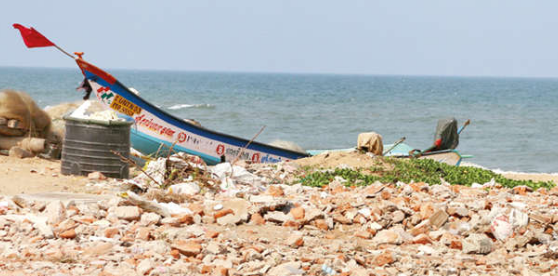Chennai police have arrested three contractors for illegally dumping debris from Chennai Metro Rail Limited (CMRL) projects onto the sands of Elliot’s Beach, commonly known as Bessy Beach. The individuals apprehended include Chellapandian from Larsen & Toubro (L&T), Sabarinath from ITDC, and Venkadesan, a sub-contractor associated with ITDC.
These arrests come after the Greater Chennai Corporation (GCC) lodged a formal complaint against CMRL in July, citing unauthorised debris dumping during nighttime operations. The contractors have been accused of disposing of construction debris along a 150-metre stretch from Oorur Olcott Kuppam to the Besant Nagar broken bridge, an area that falls within the high-tide zone of the beach. Such activities pose a significant threat to the coastal ecosystem and violate multiple environmental guidelines set by local authorities.
The GCC initiated an investigation following the complaint, registering a First Information Report (FIR) to identify the vehicles involved in the dumping activities. As part of the evidence collection, GCC’s assistant executive engineer for Adyar provided video footage showing trucks with identifiable number plates unloading debris under the cover of darkness. “We have obtained clear video evidence, and based on this, we have identified the contractors involved. The clean-up has already begun, with CMRL taking responsibility for clearing the dumped materials,” the engineer stated. Historically, CMRL had designated specific sites for the disposal of excavation materials. However, for the ongoing metro project, contractors were allowed to purchase excavated earth from CMRL upon payment of a royalty, granting them discretion over its use. Despite this arrangement, the dumping of debris on the beach is strictly prohibited and represents a clear breach of protocol.
As a remedial measure, approximately 10 metres of the dumped debris has already been cleared, with efforts underway to remove the remaining waste by the end of the month. The GCC commissioner has mandated the installation of GPS trackers on CMRL’s trucks to monitor their movements and prevent future instances of unauthorised dumping. This directive aims to enhance compliance with environmental regulations and ensure better oversight of waste management practices in large-scale infrastructure projects. The incident underscores the need for stringent monitoring and accountability in urban development projects, particularly those impacting sensitive ecological zones. With Chennai’s coastline facing increasing environmental stress, such actions by contractors are not only illegal but also detrimental to the city’s sustainability goals. The swift response by the GCC and the arrests made by the police highlight the city’s commitment to upholding environmental standards and safeguarding its natural assets from reckless urbanisation.


